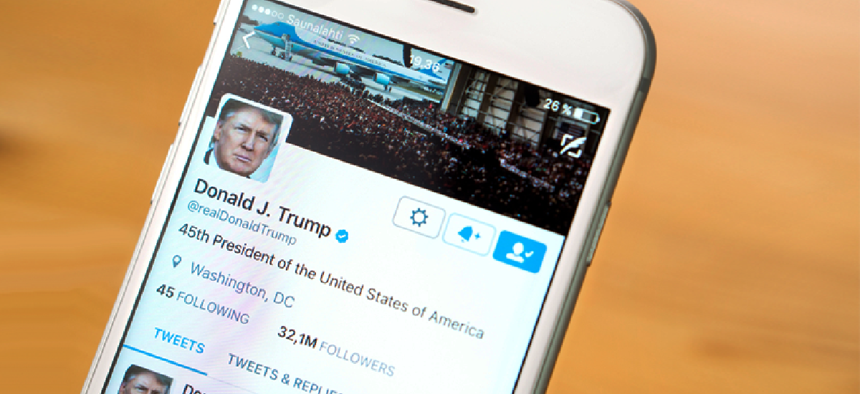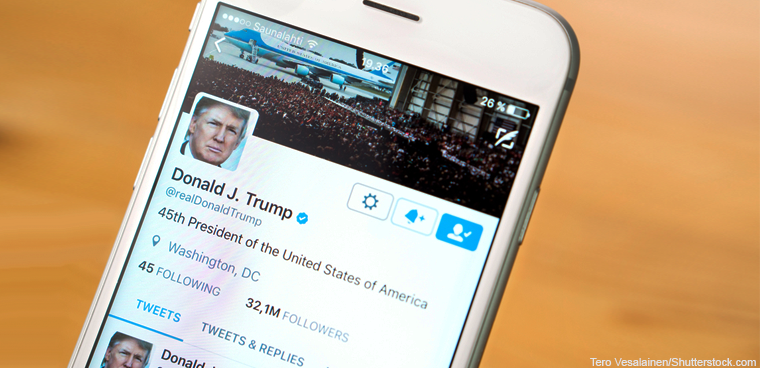Trump's Twitter blocks raise constitutional questions

After a federal judge found that official government Twitter accounts may be violating free speech by blocking users, President Trump has unblocked some accounts.

President Donald Trump's Twitter account has been his favored way to make public statements. Public, that is, except to those he's blocked.
The blocking of certain accounts -- 41, as of Aug. 10, according to the Knight First Amendment Institute at Columbia University -- creates a free speech dilemma. In May, U.S. District Judge Naomi Reice Buchwald ruled comments on government officials' Twitter handles were public forums, and blocking Twitter accounts infringed on users' rights to free speech.
Buchwald's decision found "that the blocking of the plaintiffs based on their political speech constitutes viewpoint discrimination that violates the First Amendment," and she drew a distinction between muting and blocking accounts.
While the decision did not include an order to unblock accounts, Trump's account has since unblocked some, but not all, of the once-blocked users.
Reuters reported that, as of Aug. 28, at least 20 of the blocked users said on Twitter they had been unblocked by Trump.
"If these individuals were blocked on the basis of their viewpoints, it's incumbent on the White House to unblock them immediately," said Katie Fallow, senior staff attorney at the Knight Institute.
The Knight Institute will continue to work with the Department of Justice "to ensure the White House restores access to the @realDonaldTrump account to all individuals who were blocked on the basis of their viewpoints," Fallow said.
What constitutes "viewpoints," though, gets into a broader First Amendment debate.
The Internet Association, a lobbying group representing companies like Google, Amazon, Facebook and Twitter, filed a brief in the case Aug. 14. While not taking a side in the litigation, it referenced past rulings about whether social media sites like Twitter "have a sufficient connection to governmental authority" to be considered public forums.
The brief urged the court to "carefully limit its opinion to the unique facts of this case and expressly make clear" that "only a small portion of Twitter is even arguably a public forum" to avoid a misunderstanding that "Twitter, too, can be subject to First Amendment scrutiny." It also urged the court to make clear Twitter is not a state actor and retains control over its terms of use.
More than 54 million Twitter accounts follow @realDonaldTrump.
In their appeal, Justice lawyers dropped one of their original arguments -- that the president is not subject to injunctive orders -- and now centered their case around the reasoning the @realDonaldTrump account "belongs to Donald Trump in his personal capacity and is subject to his personal control, not the control of the government."
However, in a letter to Justice, a group of attorneys representing the Knight Institute noted the Supreme Court "treated President Trump's tweets as official statements" in the Hawaii v. Trump ruling that upheld the White House's travel ban. The letter also stated that simply unblocking accounts that were blocked based on their viewpoints "would obviate the need for litigation in the district court while defendants' appeal is pending in the Second Circuit."
Justice declined to comment for this story.
The transition of Trump's Twitter account from that of a private citizen to the commander-in-chief, as well as other official digital record-keeping practices, have raised legal questions.
Whether Trump's account has the authority to delete tweets has come under scrutiny, as has government use of messaging applications designed to destroy the contents of communications.
On this front, the Citizens for Responsibility and Ethics in Washington and the National Security Archive have jointly filed a lawsuit against the president for allegedly violating the Presidential Records Act.


